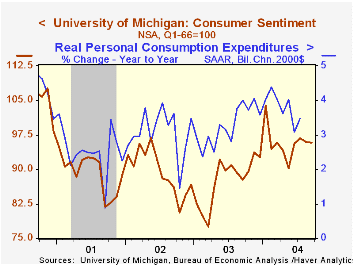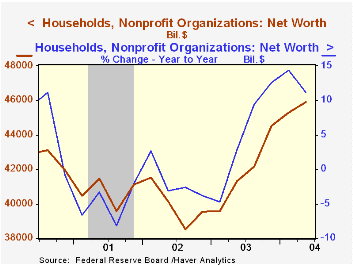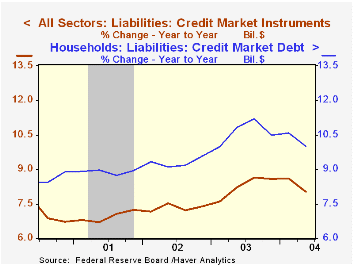 Global| Sep 17 2004
Global| Sep 17 2004U.S. Consumer Sentiment Little Changed
by:Tom Moeller
|in:Economy in Brief
Summary
The University of Michigans consumer sentiment index for mid-September was little changed from August at 95.8 but it was below Consensus expectations for 96.5. During the last ten years there has been a 75% correlation between the [...]

The University of Michigan’s consumer sentiment index for mid-September was little changed from August at 95.8 but it was below Consensus expectations for 96.5.
During the last ten years there has been a 75% correlation between the level of consumer sentiment and the y/y change in real PCE.
The expectations sub-index improved slightly to 89.4 but the index of current economic conditions eased to 105.8.
The University of Michigan survey is not seasonally adjusted.The mid-month survey is based on telephone interviews with 250 households nationwide on personal finances and business and buying conditions. The survey is expanded to a total of 500 interviews at month end.
| University of Michigan | Mid-Sept | Aug | Y/Y | 2003 | 2002 | 2001 |
|---|---|---|---|---|---|---|
| Consumer Sentiment | 95.8 | 95.9 | 9.2% | 87.6 | 89.6 | 89.2 |
| Current Conditions | 105.8 | 107.9 | 7.5% | 97.2 | 97.5 | 100.1 |
| Consumer Expectations | 89.4 | 88.2 | 10.6% | 81.4 | 84.6 | 82.3 |
by Tom Moeller September 17, 2004

The net worth of the US household sector rose 11.1% last quarter versus 2Q03.
On the asset side of the ledger, a 10.8% y/y rise in total assets was driven by a 24.9% jump in the value of mutual fund shares and an 11.8% rise in the value of owner occupied real estate. These gains offset a 12.7% decline in money market shares and a 10.6% decline in the value of Treasury security holdings.
Total liabilities of the household sector rose 9.3% y/y with a notable 11.7% rise in home mortgages. Consumer credit rose 4.0%.
Growth in credit market debt outstanding was steady at 8.0%. The federal government and US households continued to borrow at a double digit rate as nonfinancial corporations only grew their financial liabilities at a 3.2% rate.
Foreign sector holdings of US assets continued to surge, raising the foreign sector's ownership of total US financial assets to 12.4% versus 7.0% ten years ago.
| Flow of Funds (Y/Y Chg.) | % of Total | 2Q04 | 1Q04 | 2003 | 2002 | 2001 |
|---|---|---|---|---|---|---|
| Total Credit Market Debt Outstanding | 8.0% | 8.6% | 8.6% | 7.4% | 7.3% | |
| Federal Government | 12% | 10.6% | 12.7% | 10.9% | 7.6% | -0.2% |
| Households | 27% | 10.0% | 10.6% | 10.5% | 9.6% | 9.0% |
| Nonfinancial Corporate Business | 14% | 3.2% | 3.9% | 3.7% | 0.7% | 5.0% |
| Financial Sectors | 32% | 8.6% | 8.8% | 9.7% | 9.0% | 10.7% |
| Total Credit Market Assets | 8.0% | 8.6% | 8.6% | 7.4% | 7.3% | |
| Household Sector | 6% | 6.4% | 3.1% | 7.2% | -4.5% | -5.8% |
| Rest of World | 12% | 18.5% | 19.3% | 15.9% | 16.4% | 12.6% |
| US Financial Sectors | 77% | 6.8% | 7.7% | 7.9% | 7.6% | 7.9% |
| Net Worth: Households & Nonprofit Organizations (Trillions) | $45.9 | $45.3 | $44.5 | $39.6 | $41.1 | |
| Tangible Assets: Households | $15.7 | $15.3 | $15.0 | $13.6 | $12.4 |
Tom Moeller
AuthorMore in Author Profile »Prior to joining Haver Analytics in 2000, Mr. Moeller worked as the Economist at Chancellor Capital Management from 1985 to 1999. There, he developed comprehensive economic forecasts and interpreted economic data for equity and fixed income portfolio managers. Also at Chancellor, Mr. Moeller worked as an equity analyst and was responsible for researching and rating companies in the economically sensitive automobile and housing industries for investment in Chancellor’s equity portfolio. Prior to joining Chancellor, Mr. Moeller was an Economist at Citibank from 1979 to 1984. He also analyzed pricing behavior in the metals industry for the Council on Wage and Price Stability in Washington, D.C. In 1999, Mr. Moeller received the award for most accurate forecast from the Forecasters' Club of New York. From 1990 to 1992 he was President of the New York Association for Business Economists. Mr. Moeller earned an M.B.A. in Finance from Fordham University, where he graduated in 1987. He holds a Bachelor of Arts in Economics from George Washington University.
More Economy in Brief
 Global| Feb 05 2026
Global| Feb 05 2026Charts of the Week: Balanced Policy, Resilient Data and AI Narratives
by:Andrew Cates






